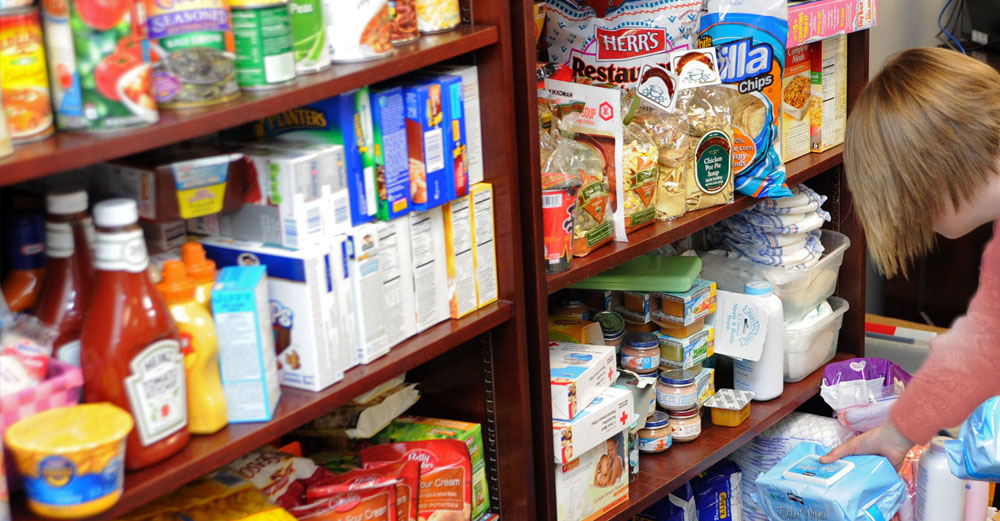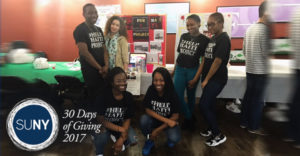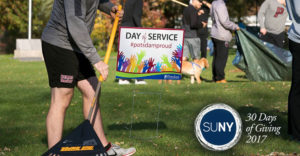
According to a study published in 2016, almost 25 percent of college students have very low levels of food security and accessibility to food. This phenomenon is known as food insecurity, which is defined by the U.S. Department of Agriculture as “the limited or uncertain availability of nutritionally adequate and safe foods or limited or uncertain ability to acquire acceptable foods in socially acceptable ways.” This issue plagues both community college and four-year college students: 25 percent of students at community colleges reported very low food security compared to 20 percent of students at four-year institutions.
To help combat this national issue, a number of SUNY schools are incorporating or maintaining on campus resources centered on food intervention.
SUNY Adirondack Community College
This past October, SUNY Adirondack opened a food pantry to help students in need. Yasmin Lopez, director of SUNY Adirondack’s Community Hub, realized that this was an area missing from student outreach.
“I was seeing that food insecurity is an issue on campus,” she said. “Students didn’t have enough food to eat, and if you are hungry, you can’t learn. We had students who were making the decision in spending money for gas to get to school or food to eat.”
The pantry, dubbed the Food Source, served 60 students within a month’s time upon opening and operates under a federal Community Schools grant. The Food Source also provides personal care items and no documentation or proof of income or need is required.
Buffalo State College
Milligan’s Buffalo State Food Pantry is available to all Buffalo State students. The pantry is located within Buffalo State’s Student Union and students can place their orders through an online order system.
Fun fact: The pantry is named after a town restaurant, Milligan’s, in Indiana that was frequented by one of the founders of the Milligan’s Buffalo State Food Pantry, Rev. Linda Harley-Mould. Rev. Harley-Mould was struggling financially during college, but the restaurant let him run up a tab and continue to eat there until his monthly check arrived.
In addition to the pantry, Buffalo State partnered with Chartwells, their campus food service provider, at the end of the Spring 2017 semester to raise donations for the food pantry. “Proper nutrition is so important for a student to be successful, and we wanted to help with that,” said Glenn Bucello, resident district manager with Chartwells. Chartwells matched students’ extra meal swipes, which resulted in a donation of 252 jars of pasta sauce, 256 pounds of penne pasta, and more. The awareness created by the meal donation drive also led to an increase in donations to the pantry.
Rockland Community College
Rockland Community College (RCC) offers its students a number of resources to support food security efforts: student food voucher program, Family Holiday boxes, SNAP assistance via Catholic Charities, People to People donations of their “It’s in the Bag” protein snacks, monthly Eat Smart NY nutrition education via Cornell Cooperative Extension, the RCC Connection Center, and the RCC food cupboard, which offers free non-perishable grocery items for enrolled students who are in need.
The faculty at RCC also lend a helping hand to lessen food insecurity for their students. This past Thanksgiving, a $21,000 gift from RCC faculty funded the purchase of holiday meal boxes for hundreds of RCC students and their families. Each holiday box contained enough food for a full holiday meal for a family of four to six people.
“Hungry students don’t do well in school,” said Professor Bill Baker, president of the RCC Federation of Teachers. “If they don’t do well in school, they don’t stay in school. We, as faculty, want to show our support for those students and this is one way of doing that.”
Schenectady County Community College
Schenectady County Community College (SCCC) has a food pantry, with a variety of non-perishable foods, for students in need. The pantry, located in Elston Hall Room 220e, was developed by faculty and staff who oversee it when it’s open Monday through Friday when classes are in session. Students who present their student ID card can receive food twice a month, with the goal of the food they receive lasting a week.
In addition, the SCCC Canal Side Convenience Store participates in the Supplemental Nutrition Assistance Program (SNAP), which provides nutrition assistance to millions of eligible, low-income individuals and families across the country, and provides economic benefits to communities, through the United States Department of Agriculture (USDA) Food and Nutrition Service.
Ulster County Community College
SUNY Ulster partnered with The Episcopal Diocese of New York Campus Ministry Committee, St. Andrew’s Episcopal Church, and Christ the King Episcopal Church to address food insecurity among students, faculty, staff, and community members by giving access to food donations through a food pantry-style service. This led to the creation of “The Pantry” in 2016, which was initially a mobile truck located in an on-campus parking lot.
After realizing this model wasn’t sustainable, the pantry was moved inside to an easily accessible student-services-centered corridor. To keep the pantry stocked with food items, SUNY Ulster hosts can drive competitions and bake sales and organizes student volunteer groups to assist in the pickup and stocking of food. The campus also applied for a grant to gain access to a dedicated vehicle for food pickups and deliveries and other outreach initiatives.
“We are one of the most affordable community colleges in the state,” said SUNY Ulster President Al Roberts. “I’m very proud of that. This [having a food pantry] just continues to add to our affordability.”
A SUNY Ulster student also used grant money to help fight food insecurity on campus and within his community. Michael Burke won a $6,000 Barnabas McHenry Hudson Valley Award from the Open Space Institute to bridge the gap between farmers and consumers and the farming community and the general public. His mission is to help diversify food pantry offerings so students have more than processed and canned foods to choose from, “It’s important that the food they do get, it’s healthy, it’s nutritious and fresh,” Burke said.
SUNY System
Recently, the Board of Trustees passed a resolution to establish a task force to study food insecurity on college campuses and recommend changes and best practices to alleviate this issue. To read more about the resolution you can access the memorandum online.
This effort is another way that we see how the future efforts across all SUNY colleges and universities to battle the dangers of food insecurity will only continue to grow.




Hi Julie Maio, Great blog post, thanks for sharing the wonderful idea.
Shocking article and shocking fact that 25 percent of college students have low levels of food security and accessibility to food. That is a very high amount, and I hope the government will bring more focus on the issues in order to solve it.
Suffolk County Community College Food Pantries information in Brentwood, Riverhead and Selden, NY https://scccalumni.wordpress.com/2017/11/22/suffolk-community-college-foundation-board-member-belinda-pagdanganan-visits-michael-j-grant-campus-food-pantry